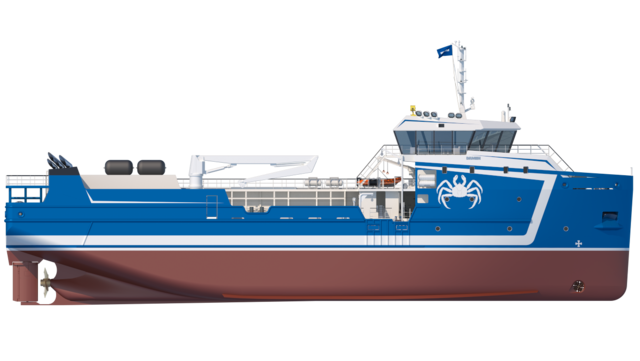Ten new crab-catching vessels for the Russian crab-catching companies Antey, Merlion and Aqvainvest will be propelled by SCHOTTEL. They will be built at different shipyards in Russia and are designed by Damen as design type CC 5712. Eight will be constructed at Nakhodka and a further two at Brothers Nobel shipyard. They are scheduled to enter operation from 2020 to 2024.

Ten new crab-catching vessels for the Russian crab catching companies Antey, Merlion and Aqvainvest will be propelled by SCHOTTEL
President of the Group of Companies Antey Ivan Mikhnov reports:
“For this project we were looking for a manufacturer with outstanding expertise and great experience. Choosing SCHOTTEL as a propulsion supplier was also an option due to its list of various references and wide service network.”
Each of the 57.7-metre-long and 12.6-metre-wide ice-class vessels will be equipped with one four-bladed SCHOTTEL ControllablePropeller type SCP 774 featuring a propeller diameter of 2.8 metres and driven by a 1,620 kilowatt, diesel engine (750 rpm). With this configuration, the vessels will achieve a free running speed of approximately 12 knots. For improved manoeuvrability, each new build will also be provided with one 400 kilowatt SCHOTTEL TransverseThruster type STT 1 CP.
SCHOTTEL for the crab-catching industry
Crab catching is a very diverse operation: On the one hand, the vessel needs to be able to get back to the fishing ground fast and efficiently and, on the other hand, manoeuvre precisely to position and haul the crab pots. Furthermore, the crab-catching grounds are rather remote areas with extremely harsh weather conditions, which demand robust and reliable equipment. A SCHOTTEL propulsion package consisting of controllable pitch propeller and tunnel thruster ideally meets these demands.
State-of-the-art calculation methods ensure that each SCP is optimally adapted to hydrodynamic conditions. In this way, operators benefit from a high degree of efficiency leading to lower operating costs and reduced fuel consumption. In addition, the robust design of the SCP keeps maintenance requirements to a minimum and ensures a long service lifetime.